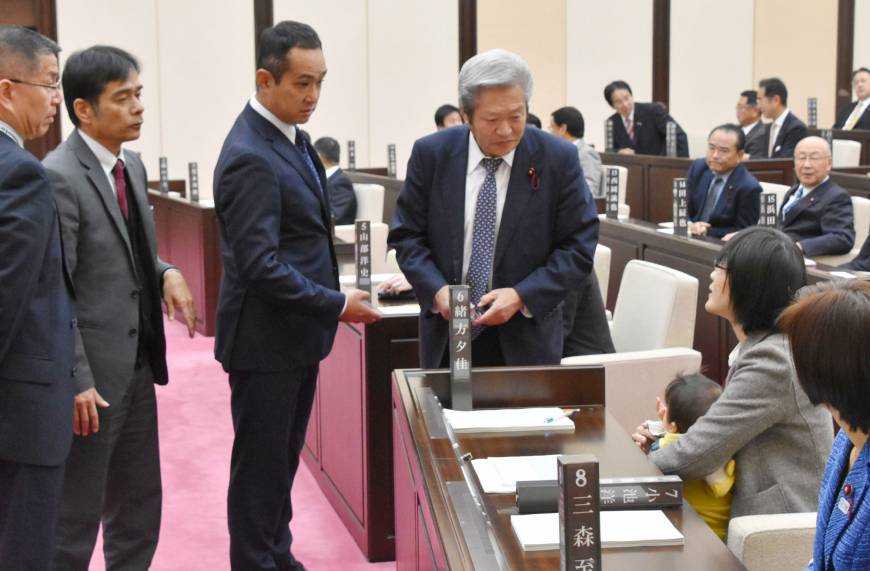By Mizuho Aoki
Japan Times, Tokyo
WWR Article Summary (tl;dr) A female politician’s decision to bring her baby to an assembly session to highlight the difficulties faced by working mothers is drawing support on Twitter, with users saying they don’t mind if people take their children to the workplace.
Japan Times, Tokyo
The use of the hashtag #KozurekaigiOK, which roughly translates as “It’s OK to bring a child to a meeting,” is believed to have been triggered by filmmaker Kazuaki Kiriya’s tweet Friday that he’s fine with people taking their children to business meetings.
“Anyone who works with Kiriya can bring their child along. Whether it’s a meeting, an interview or a film shoot, I don’t mind at all,” he tweeted after news articles about Kumamoto Municipal Assembly member Yuka Ogata began appearing.
The filmmaker’s tweet caught on, and many more users, including disabled celebrity author Hirotada Ototake, posted support for parents with small children who sometimes have no choice but to bring their kids to the workplace.
As the hashtag spread, however, those who oppose the idea began posting their opinions with the hashtag #KozurekaigiNG, which means,”It’s not OK to bring a child to a meeting.”
The heated debate sprang to life after Ogata, 42, brought her 7-month-old son to the municipal assembly chamber last Wednesday.
The speaker and the secretariat urged Ogata to take the baby out as it is against the assembly’s regulations to bring anyone other then assembly members or staff members to the floor during a session. Ogata gave in and left her baby with a friend.
Due to the incident, the session was delayed by 40 minutes, prompting some members to urge disciplinary action against her, according to the secretariat.
The mother of two said she consulted with the secretariat about bringing her child to the assembly, but when she did not get any positive response she decided to go ahead without consent.
A secretariat official disputed her account on Monday, saying they were not consulted about bringing the baby to the session and were bewildered by Ogata’s action.
This is not the first time Japan has seen a heated debate on this issue.
In the late 1980s — when it was the norm for women to quit work after giving birth — singer and actress Agnes Chan sparked the “Agnes controversy” by taking her baby to a TV studio. While some women such as novelist Mariko Hayashi criticized Chan’s decision as unprofessional, others, including sociologist Chizuko Ueno, were sympathetic.
buy xifaxan online www.mobleymd.com/wp-content/languages/new/xifaxan.html no prescription
Since then it has grown more common for women to retain their jobs after childbirth, and the government is actively encouraging women to play a more active role in the business world under Prime Minister Shinzo Abe’s call to “create a society where women can shine.” But even 30 years since the Chan incident, the concept still sparks debate.
Mari Miura, a political science professor at Sophia University and a gender equality expert, said Ogata has brought attention to the important issue of creating an inclusive environment in the political arena, which is still dominated by men.
After all, Miura said, legislatures across Japan still operate based on the assumption that lawmakers are healthy males. Because of this assumption, there is no system for lawmakers to take child-rearing leave, nor is there enough consideration for assembly members with disabilities who need the support of helpers.
“Opinions of people with different backgrounds should be reflected in any decision-making process. And women with children should not be excluded from this process (due to difficulties in juggling work and child-rearing),” Miura said. “We need to create a system or environment to include those people in legislatures.
“Japan is quite an intolerant country,” she continued. “People even raise their eyebrows at mothers carrying a baby stroller on a train. But (this attitude) has resulted in the declining birthrate that we face today. We must think about that.”
According to the Geneva-based Inter-Parliamentary Union, Japan as of Oct. 1 ranked 165th among 193 countries, after Samoa, Botswana and Belize, in percentage of female members in national legislatures.
Japan dropped in the World Economic Forum’s global gender equality ranking this month, to 114th from 111th last year, mainly due to a decline in the political empowerment of women, the Geneva-based think tank said.














































































































































































































































































































































































